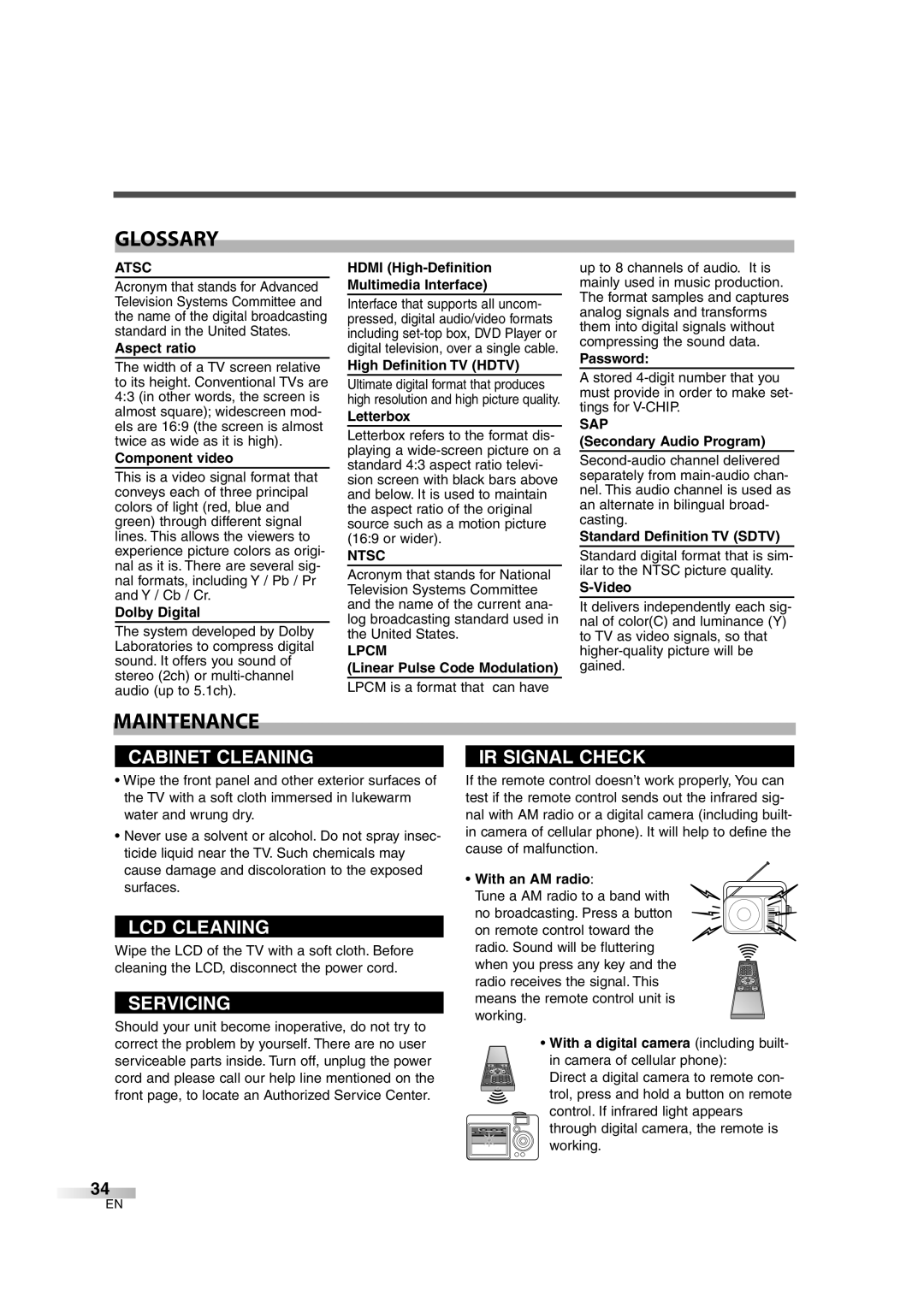
GLOSSARY
ATSC
Acronym that stands for Advanced Television Systems Committee and the name of the digital broadcasting standard in the United States.
Aspect ratio
The width of a TV screen relative to its height. Conventional TVs are 4:3 (in other words, the screen is almost square); widescreen mod- els are 16:9 (the screen is almost twice as wide as it is high).
Component video
This is a video signal format that conveys each of three principal colors of light (red, blue and green) through different signal lines. This allows the viewers to experience picture colors as origi- nal as it is. There are several sig- nal formats, including Y / Pb / Pr and Y / Cb / Cr.
Dolby Digital
The system developed by Dolby Laboratories to compress digital sound. It offers you sound of stereo (2ch) or
HDMI (High-Definition
Multimedia Interface)
Interface that supports all uncom- pressed, digital audio/video formats including
High Definition TV (HDTV)
Ultimate digital format that produces high resolution and high picture quality.
Letterbox
Letterbox refers to the format dis- playing a
NTSC
Acronym that stands for National Television Systems Committee and the name of the current ana- log broadcasting standard used in the United States.
LPCM
(Linear Pulse Code Modulation)
LPCM is a format that can have
up to 8 channels of audio. It is mainly used in music production. The format samples and captures analog signals and transforms them into digital signals without compressing the sound data.
Password:
A stored
SAP
(Secondary Audio Program)
Standard Definition TV (SDTV)
Standard digital format that is sim- ilar to the NTSC picture quality.
S-Video
It delivers independently each sig- nal of color(C) and luminance (Y) to TV as video signals, so that
MAINTENANCE
CABINET CLEANING
•Wipe the front panel and other exterior surfaces of the TV with a soft cloth immersed in lukewarm water and wrung dry.
•Never use a solvent or alcohol. Do not spray insec- ticide liquid near the TV. Such chemicals may cause damage and discoloration to the exposed surfaces.
LCD CLEANING
Wipe the LCD of the TV with a soft cloth. Before cleaning the LCD, disconnect the power cord.
SERVICING
Should your unit become inoperative, do not try to correct the problem by yourself. There are no user serviceable parts inside. Turn off, unplug the power cord and please call our help line mentioned on the front page, to locate an Authorized Service Center.
IR SIGNAL CHECK
If the remote control doesn’t work properly, You can test if the remote control sends out the infrared sig- nal with AM radio or a digital camera (including built- in camera of cellular phone). It will help to define the cause of malfunction.
•With an AM radio:
Tune a AM radio to a band with no broadcasting. Press a button on remote control toward the radio. Sound will be fluttering when you press any key and the radio receives the signal. This means the remote control unit is working.
•With a digital camera (including built- in camera of cellular phone):
Direct a digital camera to remote con- trol, press and hold a button on remote control. If infrared light appears through digital camera, the remote is working.
34
EN
